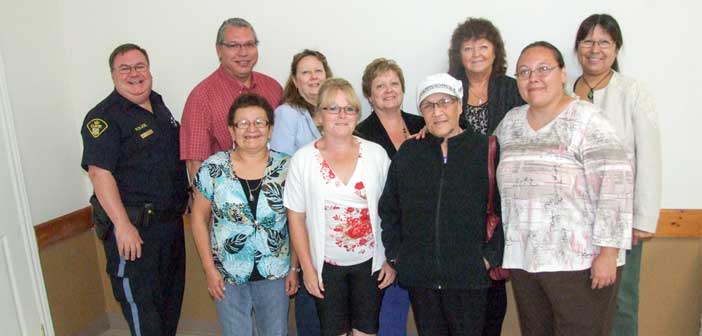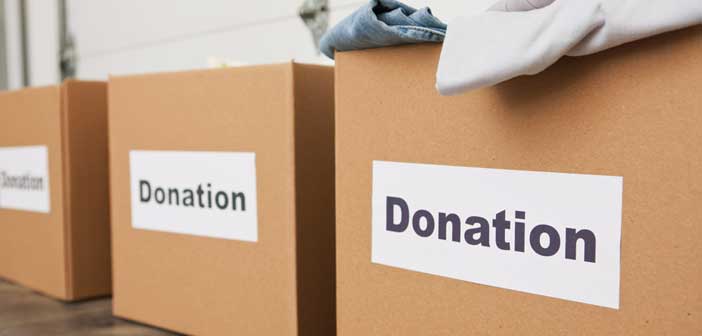MANITOWANING—Recovering from alcohol and drug addiction presents a daily challenge but from those challenges spring many inspiring stories of personal accomplishment and the support of friends, family and even complete strangers found along that long road. The Manitoulin Fifth Annual Addiction Recovery Breakfast ‘Shkimaadizwin’ (New Life) held Tuesday morning at the Assiginack Curling Club hall offered an opportunity to share some of those stories with fellow travellers on that road as well as those in the helping services.
The breakfast began with opening ceremonies that included words from master of ceremonies Constable Al Boyd, an opening prayer by elder Hank Mandamin and a powerful drum song by Dana McDonald before folks settled into the buffet breakfast.
There were two keynote speakers at the recovery breakfast, the first recovery story was presented by Jacob Wemigwans and the second by advertised keynote speaker Eleanor Pine.
“I remember back when I was three-years-old I drank about this much wine,” he said holding up his fingers to show a couple of ounces. “I puked it up and that was probably my first drink.” By the time he was a 12-year-old student, he was drinking regularly on weekends.
He did manage to wrestle his habit down in those early years after struggling with it for a long time. “That first time I got a hold of it for about two years.” But somewhere in that time he discovered drugs. “There were all these drugs around,” he said. “I tried them and that led to another addiction. It was the hardest point in my life. Drugs took over my life.”
It wasn’t an instant infatuation when it came to drugs, however. “At first I didn’t like them,” he said. But soon he found that he could no longer get through the day without them. “They became a necessity,” said Mr. Wemigwans. After a devastating back injury, he was given a prescription for opiates. “I couldn’t work because of the pain without them.”
Then one day, the doctor found something else in his blood. “The doctor called me and said that they had found something else in my system,” said Mr. Wemigwans. “He said ‘you are an addict’ and then cut me off. Then I had to get them off the street. It cost a lot,” he recalled.
The first glimmer of hope in his life came when he met a preacher. “I thought he was preaching just to me,” said Mr. Wemigwans. “Tears came out of my eyes. I realized I had put my body through a lot that night. I decided that I was going to change my life. I quit cold turkey.”
He was not alone on those first steps to sobriety, however. “I always thank my brother,” he said. “He stood with me. He stayed with me a month and I put him through a lot of abuse, especially verbal abuse. He stuck with me. I still thank him when he comes over.”
Mr. Wemigwans said that he never wanted his son to see him like that. “Being like that, I realized that I had to change something,” he said. He found strength within his culture and traditions.
He became a firekeeper and a pipe carrier. “That helped me to see what life was all about,” said Mr. Wemigwans. “I listened to other people when they talked. I learned that there is a life without drugs. I kept on that road.”
Last year, Mr. Wemigwans took on a special odyssey. “I pushed myself to go to all the workshops (in Wikwemikong),” he said. “From January to December I went to 203 workshops altogether. I found a lot of stuff.”
The workshops were a source of knowledge and accomplishment. “I came out with seven certificates,” he laughed. “My favourite was suicide prevention—Safe Talk. I can now talk myself out of suicide,” he chuckled.
He said that he does not give advice, but listens to what others have to say and that he has found the medicine wheel to be an invaluable tool and guide on the sobriety pathway. Sometimes the gains are small, he noted, describing one workshop where he provided guidance. “There were only three kids there,” he said. “But I think I got through to them. I hope they will continue on the path.”
The second speaker, Ms. Pine, hails from Sagamok First Nation, a home community to which she returned three years ago. “I was living in the big city of Toronto,” she said.
Ms. Pine has been with the Northern Ontario School of Medicine for about nine years, guiding “students who are going into doctoring.”
“It has been a great year for me,” she said. “I have celebrated my 34th year. But no cake, I am diabetic.”
When she first learned that she was diabetic she was in the hospital due to her addictions. She knew next to nothing about the disease. “I asked if it was a fatal disease,” she said. “The doctor said ‘no, your fatal disease is alcohol and drugs.’ I took both of them.”
Her addictions had so great a hold on her that a seven day treatment regime to dry out actually took 27 days. “Can you imagine when you wake up and you see these big giant frogs sitting beside you?” she asked. One of those figures was really a woman she did not know, but who provided words of comfort. “‘You will be alright Eleanor,’ she told me. I said ‘do I know you?’”
“At that time I blamed everyone else around me,” she said. “I was a 250 pound blimp when I sobered up. I felt very comfortable in my bag of clothes.” Hiding within her armour of flesh and cloth, she could take refuge from the world around her, a world she had learned to hate from a very early age.
“I am a former residential school student,” she said. “That residential school, it wasn’t very nice. I learned to hate men, I learned to hate women (and) I learned to hate myself. I didn’t want to be.”
Ms. Pine described the six months she spent in treatment, detoxifying from cocaine addiction. “I had to get up at 3:30 in the morning to go for a brisk walk,” she said. “It is part of what they do with cocaine addicts.” She had a circuit she travelled around Bell Park in Sudbury. Later in the day she would spend three hours on the stationary bike. “I had to sweat it out,” she said. “I am so grateful that I completed it,” she said. “I learned what it was to be normal, whatever ‘normal’ is. I am still crazy,” she laughed, “but that is okay.”
She spent much of those early days lashing out. “I had so much anger inside me,” she said. But when she finally got out of the treatment centre, she was stable. Those years of addiction had left their permanent mark. She had lost her children to Children’s Aid, the inside of her nose had to be burnt (cauterized) to stem the bleeding induced from snorting cocaine.
Ms. Pine recalled the people who helped her, despite herself. “There was this cop, an OPP cop, he used to peek in the door at me,” she said. “I would wake up in the car from an alcoholic seizure. He would say ‘I found you on the floor’. This cop, this OPP cop, took the time to check up on me.”
The police would ask her if she was a prostitute to finance her drug use, but it was an inheritance from her father that financed her habit. “I spent my inheritance,” she said. “I felt so guilty when I sobered up that I spent that money left behind by my father.”
She learned from her first councillor that she would have to learn to help herself, recalled Ms. Pine. She spent many years in the underworld, part of a biker society that enforced a code of silence. “You had to be tough,” she said, noting that she had been prepared for that through the intensive training she received through her residential school experience. “I didn’t trust men because of the abuse I went through in the residential school. The beatings that I took in there.”
A rebel as a young woman, Ms. Pine found her place in the school by pushing back. As a reward for her intransigence, she would spend each night cleaning the floors and walls of the main hall. “I turned that lock around,” she said. “Turned the keys on them. It became just normal to me.” Loneliness became her armour.
Ms. Pine also found her succor and salvation in her traditions, resurgent from the teachings recalled from the early days with her parents. She eventually found herself learning the teachings from a grandmother who took her under her wing as a somewhat reluctant pupil. “There was so much to learn,” she said. “How will I learn all these teachings? ‘One day at a time,’ she said.”
Ms. Pine recalled asking her teacher what would happen if she decided to leave. “‘They will follow you,’ she said. ‘There are other elders out there.’”
In time Ms. Pine became an addictions councillor herself, helping others find their way onto the path of sobriety, but the path remains in front of her. “I am still recovering,” she said. “One day at a time.”
The Mental Health and Addictions Crisis Hotline number is 877-841-1101 and Rainbow Lodge can be contacted at 77-NGWAAGAN(649-2242).




